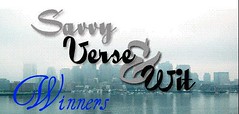
Remember, this is just for fun and is not meant to be stressful.
Keep in mind what Molly Peacock’s books suggested. Look at a line, a stanza, sentences, and images; describe what you like or don’t like; and offer an opinion. If you missed my review of her book, check it out here.
Also, sign up for the 2012 Fearless Poetry Reading Challenge because its simple; you only need to read 1 book of poetry. Please visit the stops on the 2012 National Poetry Month Blog Tour.
I’m particularly interested in the use of parentheses in today’s poem from Lola Ridge:
Sun-Up (Shadows over a cradle... fire-light craning..., A hand throws something in the fire and a smaller hand runs into the flame and out again, singed and empty..., Shadows settling over a cradle... two hands and a fire.)
What do you think?







 About the Author:
About the Author:




